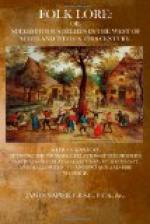Apropos of this superstition with reference to milk, the following incident occurred not many years back in the West Highlands. An old woman, who kept a few cows, was in sore distress of mind because some of her ill-disposed neighbours had cast an evil eye upon them, in consequence of which their milk in a very short time blinked (turned sour), and churn as she might, she could never obtain any butter. She had tried every remedy she knew of, or that had been recommended to her, but without any good effect. At length, in her extremity, she applied to the parish minister, and laid her case before him. He patiently listened to her complaint, and expressed great sympathy for her, and then very wisely said, “I’ll tell you how I think you will succeed in driving away the evil eye. It seems to me that it has not been cast on your cows, but on your dishes. Gang hame and tak’ a’ your dishes down to the burn, and let them lie awhile in the running stream; then rub them well and dry with a clean clout. Tak’ them hame and fill each with boiling water. Pour it out and lay them aside to dry. The evil eye cannot withstand boiling water. Sca’d it out and ye’ll get butter.” The prescription was followed, and a few weeks after the woman called upon the minister and thanked him for the cure, remarking that she had never seen anything so wonderful.
Mr. Joseph Train, from whose notes we have already quoted, mentions a ceremony, not of a private but of a public nature, and embracing a large district of country, at the performance of which he was present. The object to be obtained was the prevention of a threatened outbreak of disease among the cattle. “In the summer of 1810,” says Mr. Train, “while remaining at Balnaguard, a village of Perthshire, as I was walking along the banks of the Tay, I observed a crowd of people convened on the hill above Pitna Cree; and as I recollected having seen a multitude in the same place the preceding day, my curiosity was roused, so that I resolved to learn the reason of this meeting in such an unfrequented place. I was close beside them before any of the company had observed me ascending the hill, their attention being fixed upon two men in the centre. One was turning a small stock, which was supported by two stakes standing perpendicularly, with a cleft at the top, in which the crown piece went round in




